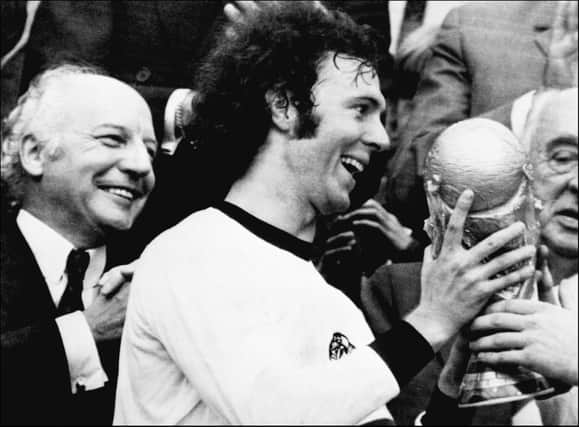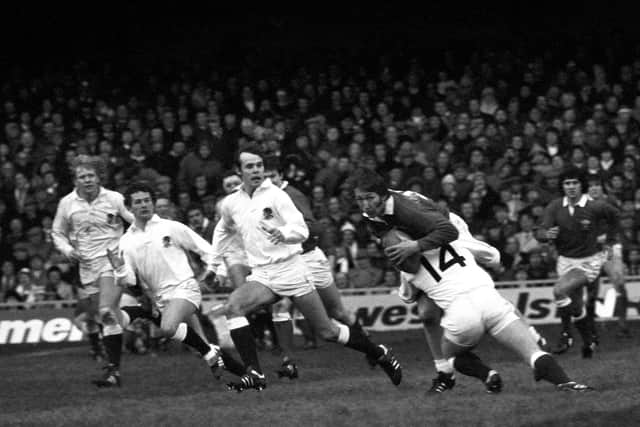JPR Williams and Der Kaiser boldly crossed the halfway line like polar explorers or astronauts - Aidan Smith


Goalkeeper, right? Actually, no. This was very much the pre-snowflake era in football when pipsqueaks weren’t permitted the concessions of lowered crossbars and narrowed posts. No blame could be attached to junior custodians and if they were lucky, they might have been able to pull off the odd, mildly heroic save.
You see, the really unglamorous task was to be plonked in the middle of the defence - just as in rugby, if your school played it, the really unglamorous task was full-back.
Advertisement
Hide AdAdvertisement
Hide AdIn the round ball game if you had, say, No 5 on your shirt, your primary responsibility was keeping the ball away from your goal, any old how. You would have to tussle with a usually much bigger - bumfluff moustache, voice beginning to break - centre-forward. You would have to head that Mitre Mouldmaster (a lot). You would have to clear your lines as quickly as possible, usually with an almighty hoof. You would not bring the ball down and try to dribble with it to spring an attack for your team, an idiotic notion which would have been rightly greeted with the censure: “Who the hell do you think you are - Franz bloody Beckenbauer?”


Woops, timeslip. I’ve got ahead of myself. Beckenbauer hadn’t quite risen to prominence as the defender who dared to cross the halfway line. But cross it a few years’ hence he most definitely did. And when this happened we all wanted his gig. We all wanted to be - though the nickname would be bestowed later - Der Kaiser.
This was true in the professional game as well. The default setting of the guys at the back in the old Scottish League was to get rid, or to pass the ball to someone who knew what to do with it. And just as football got itself a revolutionary who made a hitherto humdrum position in the team sexy, transforming his sport, so too did rugby.
There’s a sad sweetness in Beckenbauer and JPR Williams having burst into the collective consciousness together at the dawn of the 1970s and last week, passing away within hours of each other. Just like the German, the Welshman ripped up the manual. Just like Beckenbauer, Williams abandoned his post to venture over midway. These two were the equivalent of polar explorers or astronauts and their quests for new frontiers were thrilling, especially Williams with the egg in hand.
Pre-JPR, 1960s rugby had been dominated by the boot. The nadir was Scotland vs Wales at Murrayfield in ’63, a game of 111 lineouts, the vast bulk at the instigation of the Red Dragons’ captain Clive Rowlands. But five years later a rule change killed the boom into touch from anywhere on the pitch. Did rugby have somewhere in its ranks a player who could exploit the challenge presented, a counter-attacking conquistador who’d cast off the last-line-of-defence tradition of No 15 and run like the wind? Enter in ’69, back at Murrayfield for his debut, the young trainee doctor from Bridgend.
I wasn’t at that game but two years later squeezed between some of the fee-paying set in the schoolboys’ enclosure for Us 18, The Boyos 19 - still my idea, and that of many in Edinburgh who witnessed it, of rugby’s greatest. Yes, Wales that afternoon had Gareth Edwards and Barry John and Gerald Davies dashed the long way round for a last-gasp try with John Taylor’s stupendous kick winning it - but the player we all wanted to emulate was JPR.
And look like, too, with his Geronimo headband, socks round the ankles and sideboards which for virility only Slade’s Noddy Holder and the master-and-commander of telly sailship drama The Onedin Line could come close.
Catching the ball and running with it? What a brilliant concept. And in football, not hurrying to dispense with the ball as if it was marked “TNT” but elegantly sauntering through an England side gasping for the thin air of the 1970 World Cup in Mexico. Another brilliant concept, with Beckenbauer the master-and-commander of West Germany’s quarter-final comeback.
Advertisement
Hide AdAdvertisement
Hide AdThese two inspired others. George Connelly at Celtic and John Blackley at Hibernian were students of Beckenbauer. Blackley, the Leith libero, was a particularly cool dude with his long hair - JPR-esque, in fact - and shirt outside his shorts. “Sir, can I play sweeper?” became an oft-heard request, a new one for games-masters.
At Murrayfield in ’71 Williams’ opposite number was Ian Smith, a lovely fellow but with limited flair, as he himself acknowledged by calling his autobiography A Full-Back Slower Than Your Average Prop. Soon, though, Andy Irvine would arrive, fleet of foot, and Scotland-Wales matches started incorporating a private contest over who could run furthest from underneath their own posts and excite the crowd more.
Now in football everyone attempts to play out from the back, including often clodhoppigly the goalkeepers, but watching the first game after Beckenbauer’s passing, as one underperforming £100 million Chelsea player passed sideways to another against modest Middlesborough, it wasn’t difficult to wonder: “What would Der Kaiser do?”
And in rugby, with that notorious, numbing 12-kick rally between Bath and Gloucester from a few days before difficult to erase, it was all too easy to pine for the sidesteps and sideburns of JPR.
Comments
Want to join the conversation? Please or to comment on this article.